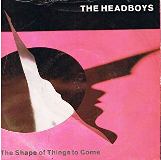
Back in the 1970s, the daytime DJs on Radio One used to pick a record of the week, this was purely the DJ choice, not the producer, of a song they particularly liked and hoped would get into the chart. The chosen song would get a guaranteed play on that particular presenter’s show every day from Monday to Friday. Some DJs used to pick quite obvious material that was likely to get into the chart anyway, but the more musical aware DJs like Mike Read, David ‘Kid’ Jensen and DLT would find the time to listen to a batch of new releases and often chose something a little more obscure. This week’s choice was a former Mike Read record of the week, just before he began presenting the breakfast show. This was the first time I heard this song and loved it straight away.
The song is The Shape of Things to Come by Scotland’s Headboys. The original line-up comprised, singer and guitarist Lou Lewis, bass player George Boyter, Calum Malcolm on keyboards and Davy Ross on drums, Lou and George had been working with some other musicians playing songs that Lou and George had written. They didn’t have a record label deal but Lou believed in their songs and so went searching, “George and I had gone to London and had a meeting with EMI publishing,” Lou explained to Lorraine Wilson, “They said they liked the band but couldn’t really see anything they could use. We asked if we could come back in a couple days and he agreed. I bought a £10 guitar, we locked ourselves away for a couple of days and emerged with some new songs to take back to the next meeting. Malcolm had just created Castlesound Studios in Edinburgh and so they recorded some demos which were sent out for publishing of which MCA records agreed to sign them, but the one thing they didn’t have was a name, so they called themselves Badger. Unfortunately the music the label wanted from the band was not what they were prepared to do, so they returned the advance they were given and walked away and dropped the name.
Lou said, “It was time to write as a band and not for publishing people. I had been going to the 100 club when I was in London and watching some punk and new wave bands and loved what I heard.” In 1978, they added saxophone player Bobby Heatlie to the line-up and recorded some more demos. “EMI showed interest again and because they had new younger employee they began to distribute our tapes to various A&R men,” Lou continued. There was a bidding war between EMI and Robert Stigwood’s RSO label and, as Lou recapped, “to be honest, we looked at both labels and thought RSO might be more fun and so we were signed by them for £100,000,” but, once again, they had no name.
Next came a change of image, “I got a severe haircut,” said Lou, “then went to a school wear shop to buy a school shirt, tie and blazer. I then went to the Army and Navy store in Union Street because they sold enamel badgers. I bought one for Calum which said ‘Head Girl’ and that’s how were became the Headboys. They went out on tour supporting Wishbone Ash and even did a gig with a newly-formed Irish band called U2.
The Shape of Things to Come, despite radio support, reached number 45 in the UK and 67 in the US. Three further singles, Kickin’ the Kans, Schoolgirls and Something’s Happening followed but all failed to make any impact. By 1981, they had had enough. “We were in our thirties so the fame thing wasn’t what we were after. My only regret is not going to America with the band but I am proud of the fact that we handed back the advance so we could start from scratch.”
They recorded one self-titled album which went un-noticed but in 2013 it transpired that they had actually recorded a second album which remained unreleased but was eventually that year under the title The Lost Album which had 10 tracks and came with a 34 page booklet telling the whole Headboys story and was dedicated to the memory of Ross, their drummer who passed away in November 2010.
Malcolm continued with his studio and worked with the Blue Nile and Prefab Sprout, he sold it in 1998 but is still in the music business. George turned to art and has enjoyed an award-winning career as a creative director in advertising in London and now lives in Oxfordshire. As for Heatlie, he went on write Aneka’s 1981 chart topper Japanese Boy and four hits for Shakin’ Stevens including the seasonal Merry Christmas Everyone which annually brings him a handsome income.